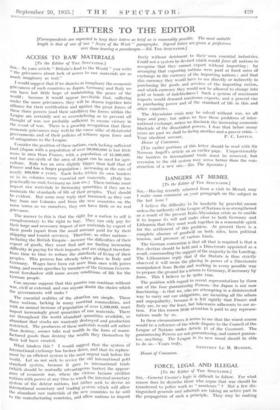LETTERS TO THE EDITOR
[Correspondents are requested to keep their letters as brief as is reasonably possible. The most suitable length is that of one of our " News of the Week " paragraphs. Signed letters are given a preference over those bearing a pseudonym.—Ed. THE SPECTATOR.]
ACCESS TO RAW MATERIALS
[To the Editor of THE SPECTATOR.] Sie,—In your article " Britain's lead to the World " you write the grievances about lack of access to raw materials arc as Much imaginary as real."
I would suggest that if we dismiss as imaginary the economic grievances of such countries as Japan, Germany and Italy we can have but little hope of maintaining the peace of the world ; because it would appear inevitable that, suffering under the same grievances, they will be drawn together into alliance for their rectification and against the great forces of these three powers (and their satellites) the forces within the League are certainly not so overwhelming as to prevent all thought of war, nor probably sufficient to ensure victory in the event of war. There is a growing recognition' that these economic grievances may well. be the cause alike of dictatorial governments and of their policies of reliance upon force and of antagonism to the League. • Consider the position of these nations, each lacking sufficient land (Japan with a population of over 90,000,000 is but little more in area than France, with a population of 41,000,000, and but one-sixth of the area of Japan can be used for agri- culture. Italy has an area slightly bigger than half that of France and has a larger population : increasing at the rate of nearly 400,000 a year). Each lacks within its own borders or in its colonies many essential raw materials. (Italy has Practically no coal, Germany no iron ore.) .These nations must import raw materials in increasing quantities if they are to maintain the standards of life of their peoples. That should be evident. But some may reply that inasmuch as they can buy from our Colonies and from the new countries on the same terms as we ourselves, they can have little or tie real grievance.
The answer to this is that the right for a nation to sell is complementary to the right to buy. They can only pay for their large and necessary import of raw materials by export of their goods (apart from the small amount paid for by their snipping and tourist services). Therefore, as other nations- ire—increase the difficulties of their including the British Emp export of goods, they must find and are finding increasing difficulty in paying for their imports, and are obliged therefore from tune to time to reduce the standards of living of their peoples. This process has already taken place in Italy and Germany. Wages have been cut more than once with prices rising, and recent speeches by members of the German Govern- meat foreshadow still more severe conditions of life for the German people.
process can continue, without Can anyone suppose that this War, civil or external, and can anyone doubt the choice which the governments will make ?
The essential realities of the situation are simple. These three nations, lacking in many essential commodities, and with an annual increase of population of over 1,500,000, must import increasingly great quantities of raw materials. There are throughout the world abundant quantities available, se abundant that stocks are wantonly destroyed and production restricted. The producers of these materials would sell rather than destroy, sooner take real wealth in the form of manu- factured goods than destroy the wealth they themselves by their toil have created.
What hinders this 'I I would suggest that the system of • international exchange has broken down, and that its replace- ment by an efficient system is the most urgent task before the Nyorld. Let us not seek to revive the old international gold gave to , international trade standard system, because it (which should he mutually advantageous barter) the appear- "nee of economic war, where the victors became creditor nations with power at any time to wreck the internal monetary System of the debtor nations, but rather seek to devise an international monetary and trading system which will allow the abundant raw materials of the new countries to be sold to the manufacturing countries, and allow nations to import freely without detriment to their own essential .industries. Could not a system be devised which would force all nations to recognise that they cannot export without importing ; • by arranging that exporting nations were paid at fixed rates of exchange in the currency of the importing nations ; and that this currency they would have to use directly or indirectly in purchasing the goods and services of the importing nation, and which currency they would not be allowed to change into gold or bonds of indebtedness ? Such a system of maximum imports would demand maximum exports, and a general rise in purchasing power and of the standard of life in this and other countries.
The Abyssinian crisis may be solved without war, we all hope and pray, but unless we face these problems of inter- national exchange, unless we diminish the increasing economic blockade of the dissatisfied powers, I fear that before many years are past we shall be facing another and a graver crisis.— [The earlier portions of this letter should be read with Sir Norman Angell's article on an earlier page. Unquestionably the barriers to international trade must be removed, but reversion to the old system may serve better than the con- struction of a new one.—ED. The Spectator.]






































 Previous page
Previous page